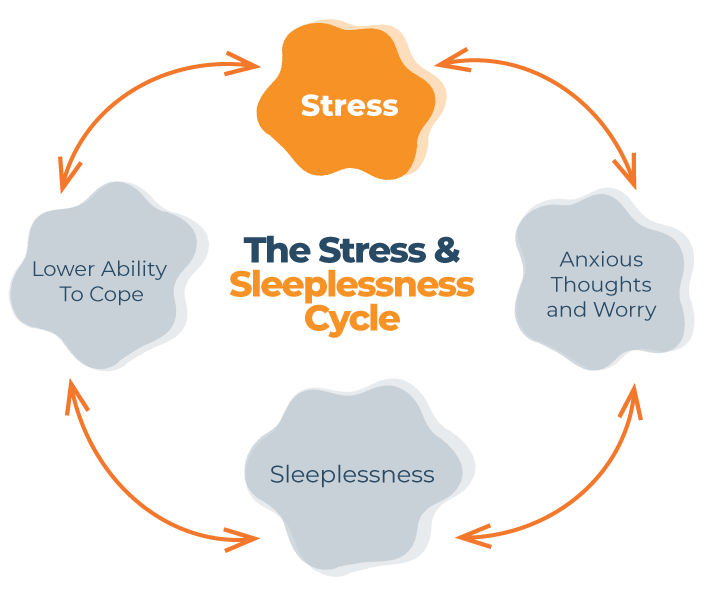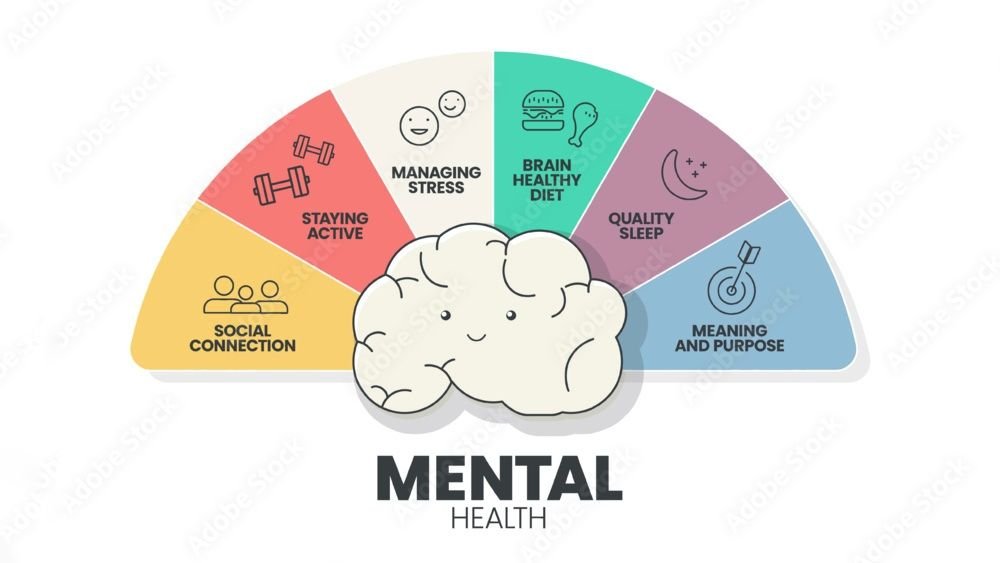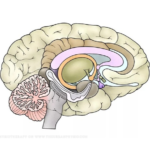Sleep is essential to our overall well-being, yet it’s often overlooked in discussions about mental health. In today’s fast-paced world, many people sacrifice sleep for work, social commitments, or even screen time, not realizing that a lack of rest can deeply affect their minds. But how exactly does sleep influence mental health? Let’s dive into the connection between sleep and the mind, and explore how disrupted sleep can contribute to anxiety, depression, and other mental health issues.
The Importance of Sleep for the Brain
Sleep is not just about physical recovery—it’s a crucial time for the brain to process emotions, consolidate memories, and regulate hormones that influence mood and behavior. During deep sleep, the brain organizes and stores important information from the day, while REM sleep (the stage where we dream) plays a role in emotional regulation and processing.
When we get enough sleep, our brains are more capable of handling stress, solving problems, and maintaining emotional balance. But when sleep is disrupted or insufficient, these processes are compromised, leading to increased stress, irritability, and a decline in cognitive function.
How Sleep Works: A Quick Dive into Science
1. NREM Sleep: This consists of three stages, with stage 3 being the deepest and most restorative. During NREM sleep, the body repairs tissues, strengthens the immune system, and builds muscle and bone.
2. REM Sleep: This is when dreams occur, and the brain is highly active. REM sleep plays a critical role in emotional regulation, memory consolidation, and problem-solving.
When these cycles are disrupted due to poor sleep habits or disorders, the brain’s ability to regulate mood, process emotions, and handle stress can be severely impaired.
The Effects of Sleep Deprivation on Mental Health
The link between sleep and mental health is well-established. Studies show that people with chronic sleep deprivation are more likely to experience mood disorders like anxiety, depression, and even bipolar disorder. Lack of sleep affects the brain’s ability to manage emotions and cope with everyday stress, which can trigger or worsen mental health problems.

Here’s how sleep deprivation affects mental health:
Mood Instability: Poor sleep makes it harder for the brain to regulate emotions, leading to mood swings, irritability, and increased emotional sensitivity.
Increased Anxiety: A lack of sleep elevates levels of cortisol, the stress hormone, which can increase feelings of anxiety and make it harder to manage stressful situations.
Risk of Depression: Chronic sleep deprivation has been linked to a higher risk of developing depression. The brain’s emotional circuits, including the amygdala, are overactive when we don’t get enough sleep, leading to negative thoughts and feelings of hopelessness.
Cognitive Impairment: Sleep deprivation impairs concentration, decision-making, and problem-solving abilities, which can contribute to feelings of frustration and a sense of being overwhelmed.
Sleep Disorders and Mental Health
Sleep disorders like insomnia and sleep apnea are closely linked to mental health issues. Insomnia, for instance, is both a cause and a symptom of anxiety and depression, creating a vicious cycle where poor sleep leads to mental health problems, and mental health problems make it harder to sleep.
Similarly, sleep apnea—a condition in which breathing is interrupted during sleep—has been associated with mood disorders. People with untreated sleep apnea are more likely to experience depression, cognitive decline, and increased anxiety due to the constant disruption in their sleep patterns.
How to Improve Sleep for Better Mental Health
If you’re struggling with sleep and it’s affecting your mental health, there are several ways you can improve your sleep habits. Implementing small changes in your daily routine can make a significant difference in the quality of your rest and mental well-being.
1. Establish a Regular Sleep Routine: Go to bed and wake up at the same time every day, even on weekends. This helps regulate your body’s internal clock, or circadian rhythm, and improves the quality of your sleep.
2. Create a Relaxing Bedtime Routine: Engage in calming activities before bed, such as reading, meditation, or gentle stretching. Avoid screens and stimulating activities that can keep your mind active.
3. Optimize Your Sleep Environment: Make your bedroom a sleep-friendly environment by keeping it dark, quiet, and cool. Use earplugs, blackout curtains, or white noise machines if necessary.
4. Limit Caffeine and Alcohol: Caffeine and alcohol can interfere with sleep quality. Try to avoid them in the hours leading up to bedtime.
5. Exercise Regularly: Physical activity promotes better sleep, but avoid vigorous exercise close to bedtime. Gentle activities like yoga or a light walk can help you wind down.

The Role of Physical Fitness and Lifestyle in Improving Sleep and Mental Health
Improving sleep is not just about what happens at night—it’s influenced by our daily routines, including physical fitness, nutrition, and mental health practices.
1. Exercise: Regular physical activity is one of the most effective natural sleep aids. Exercise helps regulate the circadian rhythm by boosting daytime alertness and reducing stress hormones. Studies show that moderate-intensity exercise, such as walking, cycling, or swimming, can improve sleep onset latency (the time it takes to fall asleep) and sleep efficiency (the amount of time spent sleeping relative to the time spent in bed).
2. Diet and Nutrition: What we eat plays a crucial role in sleep quality. Consuming foods rich in tryptophan (an amino acid that converts to serotonin) such as turkey, oats, and bananas can promote sleep. Additionally, magnesium-rich foods like spinach and almonds help muscles relax, while avoiding caffeine and sugar close to bedtime prevents stimulating the nervous system.
3. Sleep Hygiene: Establishing healthy sleep habits, known as sleep hygiene, is critical for promoting restorative rest. This includes maintaining a regular sleep schedule, creating a sleep-friendly environment (dark, cool, and quiet), and avoiding stimulants like screens before bed. Meditation and breathing exercises can also help calm the mind before sleep.
When to Seek Professional Help
If you’ve tried improving your sleep habits but continue to experience poor sleep and its mental health effects, it may be time to seek professional help. Cognitive Behavioral Therapy for Insomnia (CBT-I) is a highly effective treatment for chronic sleep issues and can help you address the root causes of insomnia and anxiety.
Consulting a healthcare provider is crucial if:
- You experience persistent difficulty falling or staying asleep.
- You feel constantly fatigued despite sleeping for enough hours.
- Your mood, anxiety, or cognitive function is severely affected by lack of sleep.
Professionals can help identify underlying causes such as sleep disorders, mental health conditions, or lifestyle factors, and create a personalized treatment plan.
Conclusion
The connection between sleep and mental health is undeniable. While life’s demands may make it tempting to sacrifice sleep, doing so can have serious consequences for both your emotional well-being and your cognitive function. Prioritizing sleep as part of your mental health routine can improve your resilience, mood, and ability to cope with life’s challenges.
Remember, good mental health starts with a good night’s sleep. If you’re struggling to find balance, don’t hesitate to seek support and explore therapies that can help you break the cycle of poor sleep and mental health issues.





